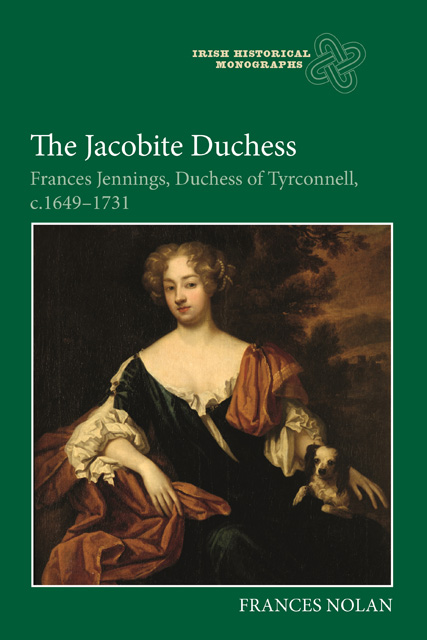Book contents
- Frontmatter
- Dedication
- Contents
- List of illustrations
- Acknowledgements
- List of abbreviations
- Notes on the text
- Introduction
- 1 ‘The malicious little gipsy’: Early life, c.1649–65
- 2 ‘Hambleton is now going into France’: Marriage, motherhood and migration, 1666–76
- 3 ‘Ruined beyond redemption’?: Widowhood, remarriage and returning, 1676–86
- 4 ‘That caballing humour’: A political woman, 1687–90
- 5 ‘Every one’s eye is watching’: Treason, forfeiture and exile, 1691–99
- 6 ‘Always a plane dealor’: Changing fortunes and life in the Low Countries, 1700–08
- 7 ‘A duchess-nun’?: Family, faith and finance in old age, 1708–30
- 8 ‘Albion’s fairest plant’: Death and legacy, 1731
- Appendix A: Duchess of Tyrconnell’s family tree
- Appendix B: Books in the possession of the duchess of Tyrconnell in Dublin, transported from her apartment in the Château de Saint-Germain-en-Laye
- Appendix C: David Nairne’s ‘Cyffer w[i]th the D[uche]sse of Tyrconnel, 5th August 1702’
- Bibliography
- Index
- Irish Historical Monographs previous volumes
7 - ‘A duchess-nun’?: Family, faith and finance in old age, 1708–30
Published online by Cambridge University Press: 04 January 2024
- Frontmatter
- Dedication
- Contents
- List of illustrations
- Acknowledgements
- List of abbreviations
- Notes on the text
- Introduction
- 1 ‘The malicious little gipsy’: Early life, c.1649–65
- 2 ‘Hambleton is now going into France’: Marriage, motherhood and migration, 1666–76
- 3 ‘Ruined beyond redemption’?: Widowhood, remarriage and returning, 1676–86
- 4 ‘That caballing humour’: A political woman, 1687–90
- 5 ‘Every one’s eye is watching’: Treason, forfeiture and exile, 1691–99
- 6 ‘Always a plane dealor’: Changing fortunes and life in the Low Countries, 1700–08
- 7 ‘A duchess-nun’?: Family, faith and finance in old age, 1708–30
- 8 ‘Albion’s fairest plant’: Death and legacy, 1731
- Appendix A: Duchess of Tyrconnell’s family tree
- Appendix B: Books in the possession of the duchess of Tyrconnell in Dublin, transported from her apartment in the Château de Saint-Germain-en-Laye
- Appendix C: David Nairne’s ‘Cyffer w[i]th the D[uche]sse of Tyrconnel, 5th August 1702’
- Bibliography
- Index
- Irish Historical Monographs previous volumes
Summary
The duchess of Tyrconnell’s return to Dublin in 1708, when she was aged around sixty, occasioned a curious development in accounts of her life, whereby she is consistently presented as a static figure, committed to a life of piety while waiting to die. In Little Jennings, Sergeant describes the last two decades of her life thus:
After a stay with her sister at their birthplace the Duchess of Tyrconnell went on to Dublin; and from that point her history practically ceases until her death twenty-three years later. She took a house in Paradise Row, Arbour Hill, near Phoenix Park, and there passes the remainder of her days … In Dublin she laid out part of the money of which she was accused of being so fond on the foundation of a nunnery in King Street, for the order of the Poor Clares; and as this was close to her home she no doubt interested herself constantly in the work of the nuns.
Sergeant’s remarks on the duchess of Tyrconnell’s old age were based on earlier accounts, including her biography in Anna Brownell Jameson’s nineteenth-century Court Beauties of Charles II. It was a representation of her later life that took root. In a brief article on ‘Fanny Jennings’, published in the 1960s, Leon Ó Broin similarly reflected that ‘so far as can be ascertained, she never left Ireland again in the twenty-odd years of life that remained to her’, adding that ‘Our knowledge of her movements in the period after 1708 is very fragmentary’. Ó Broin’s observation on the fragmentariness of the record is not entirely incorrect; there are periods in which Frances disappears from view. There remains, however, substantive evidence of her life in old age and her death in 1731; this evidence shines a light on her familial relationships and friendships, her religious practice, her mobility, her estate management and financial transactions, and her material world.
The claim that her ‘history practically ceases’ or is ‘very fragmentary’ following her return to Dublin is underpinned by a past tendency among scholars to look away from the archive once all the men of consequence have quit the scene. It is no coincidence that the material facts of Frances’s life ceased to be important once she had done her job for the duke of Marlborough and the exiled Stuarts, and returned to Ireland.
- Type
- Chapter
- Information
- The Jacobite DuchessFrances Jennings, Duchess of Tyrconnell, c.1649-1731, pp. 168 - 191Publisher: Boydell & BrewerPrint publication year: 2021



